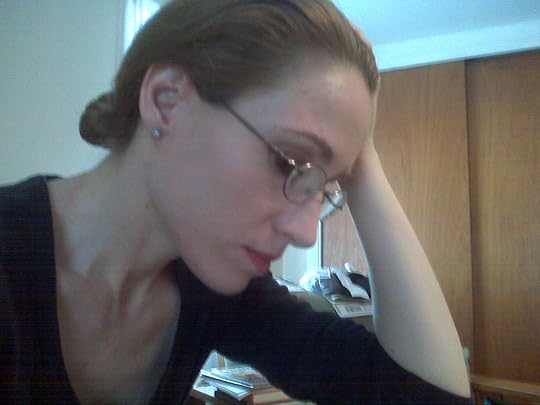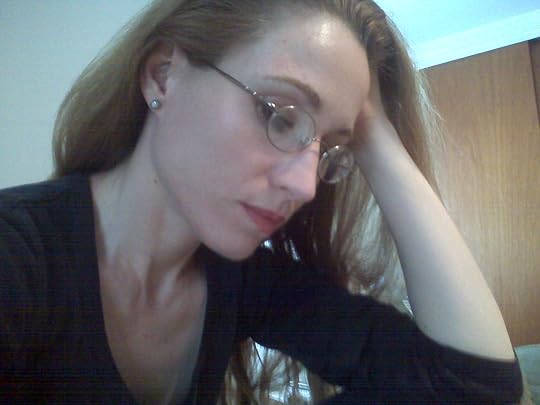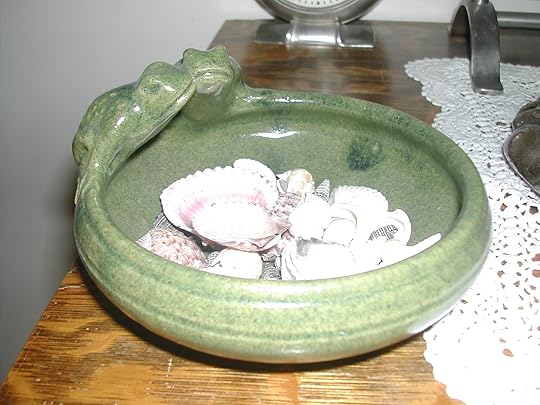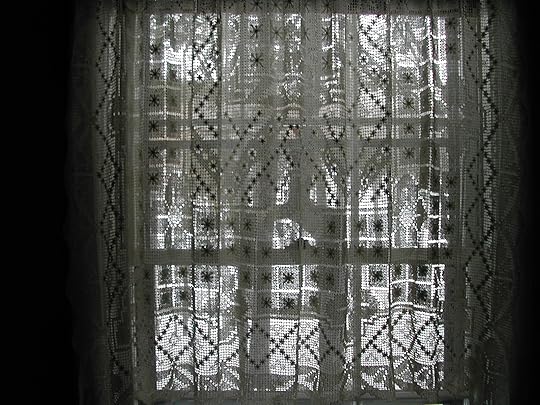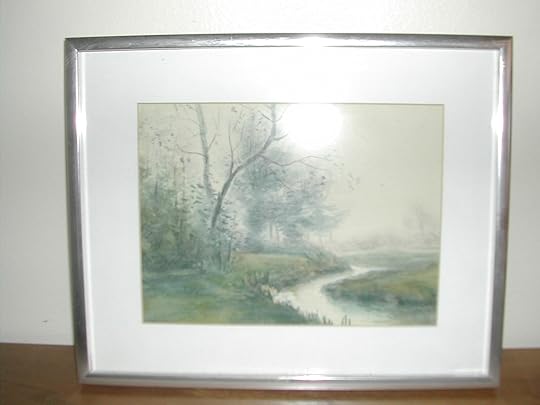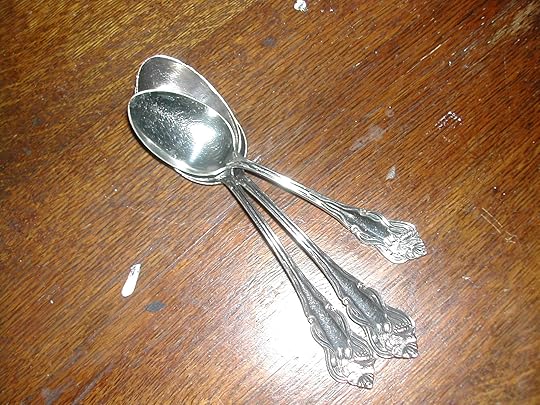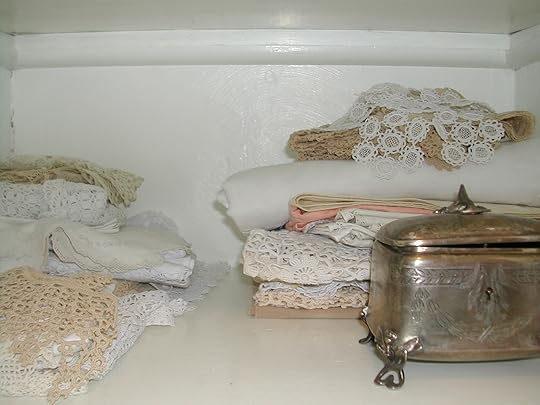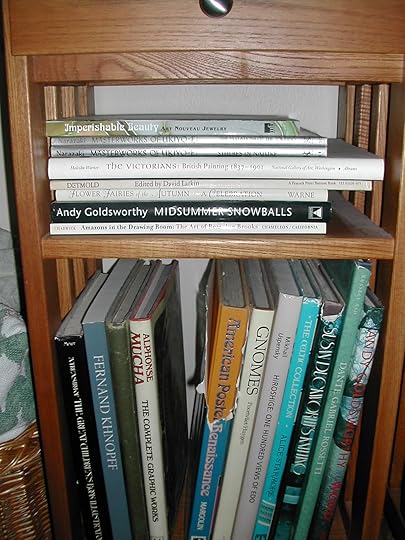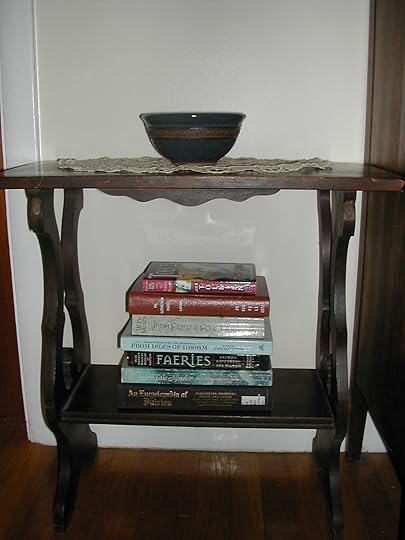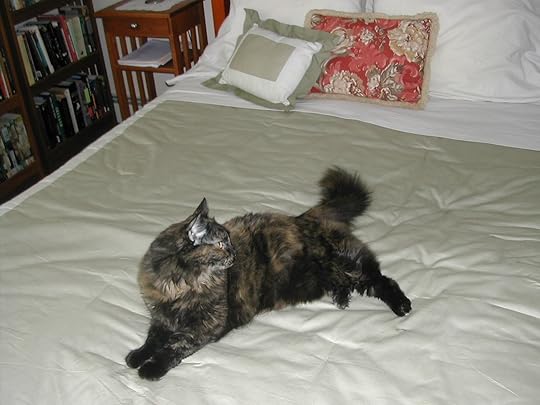Theodora Goss's Blog, page 66
March 2, 2011
The Next Year
I am tired and sad, and so I think I'll write about what I want to happen in the next year.
First, I want to finish the academic work I'm doing.
Second, I want to create a life for myself in which I can do the things I love, spend time with the people I love. I have this image in my mind of going down to North Carolina, renting a house on the beach, asking my best writer friend to come stay with me so we can both write there. It's always nicer to share something with someone, whether ice cream or an experience. And I specify my best writer friend because I can't imagine anything better than sharing both the ocean and writing.
Imagine waking up, taking a long walk on the beach, collecting shells. I haven't been to the ocean in a long time, but I still remember how the sand feels beneath my feet, how the water curls around my ankles. In North Carolina, the beaches are lined with old houses, faded from sun and salt, sitting behind the dunes. And there are pelicans drifting overhead. And the wind in the sea oats makes a particular sort of sound, a shushing that you can hear all night, together with the shush of the waves.
Imagine having breakfast and then getting to work, spending the morning writing. Lunch, and then talking about what was accomplished that morning, about how the novels are going. (These are to be novels, of course. My first novel, my friend's third or fourth.) Reading sections aloud. Troubleshooting.
A nap in the afternoon, curled up in that warm air.
Dinner would be seafood of some sort, fish or crab. I still remember the crabs we ate when we went to the ocean, when I was a child. Directly off the brown paper spread on the table, using a mallet to break the shells. The simplest foods are always the best.
And then perhaps sitting on the beach, talking in the darkness. About all sorts of things, talk as rambling as one of the beach roads, as comfortable as an old quilt. I still remember how moonlight looked on the waves, and the stars overhead. So many stars!
And finally, sleeping. There is nothing like sleeping near the ocean, listening to the waves all night long. It's like being rocked by the earth itself. I have always slept well, by the beach.
I have thought, from time to time, of doing something like this with a group of friends, of inviting a group of writer friends to come to the ocean with me and just write. But first perhaps with one person, whom I know and whose writing I know well. (And yes I'm thinking of someone specific, and yes you know who you are, and yes this is code for get working on that novel, because I want to read it! And critique it. By the ocean.)
Tonight I am tired and sad, and I want to rent a house on the beach in North Carolina, and I want to start working on a novel. For now, the fantasy of it will have to do, because there's work to be done. But eventually, after my academic work is finished – then, it will be time for the real thing. (And I'll probably get a sunburn on my nose. But that's all right.)








March 1, 2011
The Snow Queen Dreams
When I bought Seanan McGuire's CD Wicked Girls, I thought my favorite song on it would of course be "Wicked Girls." But it's not. It's a song called "The Snow Queen Dreams."
There isn't a version of the song online, but Seanan has posted the lyrics. I want to write about the song, so I'm going to write about it as though it were a poem.
This is how it starts:
"The Snow Queen dreams of glittering ice and honey,
While the King of the Summer dreams of the Snow Queen's eyes."
It's about two characters, the Snow Queen and the King of the Summer. They are in love with each other, but they each rule different parts of the year, and they can only meet on the days when those parts of the year meet. During the days when one of them is inevitably dying.
"The Snow Queen sleeps in bowers of snow and ivory,
While the King of the Summer sleeps in the forest's arms.
They're both trying to do what's right
Lost in the fading limnal light,
And they've never had any defense from the other's charms.
And a season has little regret for the ones that it harms."
They're both circling with the year, necessary parts of the seasons and so keeping to their own places in that circle. They're both trying to fulfill their respective obligations, as summer and winter. But "they've never had any defense from the other's charms," and so they dream of each other. This is the refrain:
"And she dreams of winter roses, fields of more than frozen snow,
And he dreams of summer blizzards, trees where arctic apples grow.
And they each dream of the other, and they each dream on their own,
And the days wear down the seasons as the sea wears down the stone."
She dreams of roses, but in the only way she can: I imagine roses made of ice. He dreams of blizzards, but the only way he can: and here I imagine a blizzard of apple petals, falling. And the days wear down the seasons, and they wait for those liminal days between the seasons when they can meet again.
I think these are some of the most beautiful lines in the song:
"They're both captives of what they are,
In a prison with days for bars,
And the years fade to ash before anyone knows that they're gone.
And the hands reaching out through the dark always wind up withdrawn."
These are images of time passing, of loneliness, of darkness. But still they dream of each other as the year goes round and round. And when they do meet, because they are opposites, they destroy each other:
"And the King of the Summer knows that her kisses burn.
And no matter how often they meet, they can never quite learn."
They meet when the summer dies, when the winter dies. In autumn, in spring, in the liminal seasons. That is what they dream of during summer and winter, those days of meeting:
"And they dream forever autumn, when the frost first comes to call,
And the jack-o-lanterns flicker through the candied light of fall.
And the summer and the winter can go walking hand in hand,
And a queen can be a woman, and a king is just a man."
Those are the days when they can exist not as mythological creatures, not as their respective mythic identities, but simply as themselves. I think that spring and autumn are my favorite seasons, the seasons of change and possibility. Summer and winter seems such stasis by contrast, although of course the circle of the year is always turning.
"The Snow Queen dreams of kisses as sweet as honey,
While the King of the Summer dreams of the Snow Queen's hands.
They're both circling round and round
On familiar holy ground,
And the King of the Summer knows that she understands.
And they'll dance to turn the year, and they'll dance for their lands."
They both understand the conditions under which they're living, they both know that the year needs them to turn the wheel. They both understand their places in the natural order. And so they stay in those places, even as they dream. This is how the song ends:
"They're both circling round and round
On familiar holy ground,
And the King of the Summer's hands cup the Snow Queen's heart.
And they're both of them dancing alone . . . and they're never apart."
They're never apart because they dream of each other, but also because they're both part of a natural cycle, two halves of one whole that would not exist without them. So they fulfill their duties. But when spring comes, and when autumn comes, they walk hand in hand, and the Snow Queen is a woman, and the King of the Summer is a man, no longer representatives of the seasons. For a while, at least.
The song is a love story that is both sad and beautiful, and I wish I could link to the version I have, but if you want to listen to it, you'll need to buy the CD.
I love it when a song tells a story like that. And I love stories with mythological themes. But I will say, thank goodness our lives are not like that, that we have choice and agency. It's common, in mythology, for the gods to envy us exactly that: our ability to choose our destinies. That's both the gift and the burden we have as human beings. And I wouldn't trade that for all the bowers of snow and ivory in the Snow Queen's realm.








On Faith
Sometimes it's 5 a.m., and all you have is faith.
Did you guess that it's 5 a.m.? Yes, it's 5 a.m.
Things I do not have at 5 a.m.: The ability to think clearly. Appetite (feeling sick, actually). The ability to concentrate on any task. I have spent the last seven hours going over a manuscript that I somehow, over the last month, got down to 120 pages. Of academic prose. (Including endnotes.)
In academic prose, you are not allowed to use figurative or poetic language. You have to make sure that anything you say can be supported. You cannot make claims that are too large, but if you make claims that are too small, you don't have an argument. You can't say different than: it's different from. There are all sorts of other rules, but at the moment I've forgotten them. That's what happens at 5 a.m.
At that time, when it's still dark and you're sitting there in the darkness, with only a desk lamp on, typing on your computer (as I am now), all you have is faith that what you're doing is worthwhile, that what you have written is worth something even if, looking at it again for the hundredth time, you think that it may have been written in a foreign language. Because you no longer understand it.
We tend not to talk about faith too much. It's not very popular nowadays. We would rather have ambition, intellect, drive, whatever it is that allows us to get ahead by our own efforts. Faith is for the times that you're so tired you can barely keep typing. When all those other things seem to have gone away, and your mind feels completely empty. When you can't even remember the definition of figurative language. (I had to look it up.)
You can have faith in the internal – in your own abilities. Or, and again this is not very popular – you can have faith in the external, in whatever it is that the universe intends for you. (Mother Night, the tapestry woven by spiders, the pattern we don't see: there you go, symbolism. Figurative language.) And I do believe that we shape our destinies, really I do. But I also believe in a pattern, and that I am a part of it, and that it will come out right in the end. Despite all the places where it doesn't look like it's coming out right, because I'm only seeing the part of the pattern I'm in at the moment, not the whole. And anyway, I'm only seeing it from the back.
I do wish the universe would let me get more sleep?
Although here I am writing, because I had these thoughts on faith and the necessity for it. And in particular because a friend I was talking to earlier today mentioned the subject, and I wanted to say: have faith. That's always a difficult thing to say to another person, because it seems presumptuous, doesn't it?
But even though it's dark now, at 5 a.m., it will soon be light, and even though I can see banks of snow from my window, they will soon melt, and Spring will come, and time will pass, and things will change. That's not even something we need to have faith in: we know it will happen. What we have faith in is that the change will be meaningful, will bring what we want or need into our lives.
I have faith in that too, that things are changing for some purpose. Probably a purpose I won't understand until whatever it is has happened, and the manuscript I finished tonight is part of that change. Everything I do now, every story I write, is part of it.
The prospect of change always fills me with optimism. Even at 5 a.m., when I'm so tired that my hands are heavy on the keyboard.
Good night, good morning. It's time to get some sleep . . .








February 27, 2011
Missolonghi 1824
Today, I looked like this:
Except when I looked like this:
I spend the entire day revising a hundred and twenty pages of academic prose (including endnotes). Which is probably why my brain no longer seems to be working. I thought about what to write tonight, and could not come up with anything at all.
And then I thought, why not write about one of my favorite stories of all time? It's John Crowley's "Missolonghi 1824," which I have in a collection called Novelties and Souvenirs. It's a story in which the main character is Lord Byron. I read the story many years ago and then somehow lost track of it. The problem was, for some reason I thought it was by Isak Dinesen, which to my mind is actually a compliment. I would love someone to mistake one of my stories for one of Dinesen's. She also wrote a story about Byron. I don't remember the name of her story – I would have to look it up, and honestly I don't have the energy. It's actually not as good as Crowley's, although I think Dinesen is one of the best storytellers ever. In Dinesen's story, someone tells Byron, close to his death, that he has created one of the best stories ever told. Byron asks what it is, naming various possibilities, and is told that no, it's not a story he has actually written, but the life of Lord Byron. Or am I making this up? I haven't read that story for years, so perhaps I'm getting it wrong.
But I finally found "Missolonghi 1824″ again, and was very glad to have done so. Now I give it to friends who I think will appreciate it – they have to be the sort of people to whom I would give very fine things, the finest things, and trust them with it. Whom I would trust with a glass vase once owned by the Medicis, or my personal airplane, or a heart. If they understand and appreciate it, I know they're the right sort.
I'm going to tell you about the story, so if you haven't read it, go and read it now. I don't want to spoil it for you.
It starts by introducing us to an English nobleman who is dying. (At Missolonghi in 1824, of course. That's how we know it's Byron, who is never named in the story.) He has a companion, a young Greek boy. And he tells that boy a story of how, years ago, he came to Greece for the first time and felt at home there. He says,
"As soon as I set my foot on these shores, I knew I had come home. I was no citizen of England gone abroad. No: this was my land, my clime, my air. I went upon Hymettus and heard the bees. I climbed up to the Acropolis (which Lord Elgin was just conspiring to despoil; he wanted to bring the statues to England, to teach the English sculpture – the English being as capable of sculpture as you, my dear, are of skating). I stood within the grove sacred to Apollo at Claros: except there is no grove there now, it is nothing but dust. You, Loukas, and your fathers have cut down all the trees, and burned them, out of spite or for firewood I know not. I stood in the blowing dust and sun, and I thought: I am come two thousand years too late."
He was haunted by this sense of belatedness, of having missed things: Homer and Pindar and Sappho.
He went at last into Arcadia. There, at evening, he came to a village. The villagers had captured something that day. Byron asked to see what it was, wanted to intervene, perhaps save it. The village priest tried to dissuade him, talked about a wild man who spoke but was not understood. At night, after having bought many rounds of drinks for the village men, Byron was able to go see for himself. And he saw.
"You know the eyes of your ancestors, Loukas, the eyes pictured on vases and on the ancientest of statues: those enormous almond-shaped eyes, outlined in black, black-pupiled too, and staring, overflowing with some life other than this world's. Those were his eyes, Greek eyes that no Greek ever had; white at the long corners, with great onyx centers.
"He blinked again, and moved within his cage – his captors had made it too small to stand in, and he must have suffered dreadfully in it – and drew up his legs. He struggled to get some ease, and one foot slid between the bars below, and nearly touched my knee where I knelt in the dust. And then I knew why it was that he spoke but was not understood."
He put his face to the bars of the cage, and started to say the only lines he remembered in the language this creature must have known: "Sing, Muse, that man of many resources, who traveled far and wide," the first lines of the Odyssey. And the creature, hairy, with cloven hooves and horns on its head, understood.
Byron thought, "I have not missed it after all: it awaited me here to find."
And then he cut the ropes that held the door of the cage closed, and Crowley gives us some of the most beautiful lines in the story: "The moon had risen, and he came forth into its light. He was no taller than a boy of eight, and yet how he drew the night to him, as though it were a thing with a piece missing until he stepped out into it, and now was whole."
I am telling you pieces of the story, but there is so much more. For instance, there are these lines, so beautiful: "No gift was given me, no promise made me. It was like freeing an otter from a fish trap. And that, most strangely, was what gave me joy in it. The difference, child, between the true gods and the imaginary ones is this: that the true gods are not less real than yourself."
Years ago, inspired by this story, I wrote one myself called "Catherine and the Satyr." It's not one of my best stories, and in comparison with Crowley's, to which I would give five stars, I would probably give it one. (Talk about the anxiety of influence!) The problem with my story is that, while Crowley's is about the characters, mine is about ideas – about the end of the Enlightenment and the beginning of Romanticism. It's probably not a good idea to write a story that is about ideas rather than characters. But I won't make excuses for myself. Sometimes stories work well, and sometimes they work less well.
But what I wanted to end with, really, were three things.
First, my favorite line in the entire story, and one of my favorite lines in literature ever: "But without love, without its wild possibility, he could no longer defend himself against the void: against his black certainty that life mattered not a whit, was a brief compendium of folly and suffering, not worth the stakes." I think love does that, saves you from the void. Even the knowledge of it, knowing that it is there, saves you.
Second, an idea about fantasy: I never believed the notion that science fiction was about a "sense of wonder." But I do think that fantasy is about a "sense of longing." People accuse fantasy of being nostalgic, and sometimes it is, but what we see in this story is a sense of longing for something more than our modern age can provide, for a magic that no longer exists in the world. The story tells us that it still may, in remote corners of it. Fantasy is about that – our sense of longing for more than we have, for a magic that we seem to have lost or never had. At least it is for me.
And third: I really, really want to go to Greece.








February 26, 2011
The Second Key
"Hey, girl."
She rolled over and opened her eyes. "You're already dressed."
"Got a phone call early this morning. I need to go."
The room was filled with light, filtered through white gauze curtains. What time was it? "Where are you going, this time?"
"Long, long ago, when Rome was only a wolf pup."
"What if you don't come back?"
"I always come back, don't I?"
That was fair, he did always come back. Even after dying.
"When will I hear from you?"
"That, I can't tell you. But I'm taking my magical cell phone with me." It was, indeed, a magical cell phone. Once, he had called her from the Pleistocene. He reached down, brushed her hair back from her face. It was spread across the pillow. He felt a pain in his chest – a feeling he was still getting used to. Sometimes he wished it would go away, but it was a necessary price for this – the light, coming through the curtains and falling on the old oak of the bed, polished by many hands, the rows of books in glass-fronted shelves, the woman on the bed, curled into the coverlet.
"Listen," he said, sitting beside her, then leaning on his elbow and tracing his finger over her cheek. "Can you do me a favor? Try not to make me such a jerk."
"It makes for a better story." She smiled up at him, and he could not help leaning down to kiss her.
"All right, then. Make me as much of a jerk as you want. If it's for the story's sake."
"I'll try to improve your character, by and by."
"Many thanks."
He never said goodbye, he just left. It was one of their rituals. He would walk through a door, any door, and then he was gone.
After he was gone, she got up, walked into the next room, and sat down at her desk. She looked out the window for a moment. It was spring, and across the lawn the crocuses were in bloom. The forsythia would be blooming soon. There was Cordelia, watching something. Yesterday, the cat had left a baby mouse on the doorstep. She picked up her pen, looked down at her notebook, wrote something. Crossed it out, wrote something else: The Second Key.
"There were two keys," said Professor Mandragora. "Mrs. Moth took one of them, but we never told her about the other. That's what Leonora wants to find."
"Where did you put it?" asked Matilda.
"Your aunt took it home with her over the holidays. She told us that she hid it somewhere in Tillinghast House. The safest place she could find."
"And you never asked her where, or used it again?" I asked, incredulous.
"Well," said Professor Mandragora, "for the rest of that semester, we were all forbidden from seeing each other. And the next semester we learned how to travel to the Other Country ourselves. We didn't need it anymore. We didn't exactly forget about it, but we went on to other things. Like the dragon we put on the roof of the school, junior year. We would have been suspended for that too, if we'd been caught. And Tillinghast House seemed as safe a place to leave it as anywhere else. But now you're going to have to find the key. It's too dangerous to leave in Tillinghast House with Sitgreaves there."
"Why do we have to find it?" asked Emma.
"Because Matilda is the only one who can get into that house without arousing Leonora's suspicions. I can't go, she'd remember me right away. But Matilda is supposed to visit her aunt, right? Darnation, look at that!" She was pointing to a large clock on the laboratory wall. It had thirteen hands, telling the time in thirteen different time zones, and it indicated the phases of the moon. "It's almost three o'clock. I'm supposed to be teaching a class in a few minutes! Tell me when you find the key, girls. Just look where Matilda would have considered safest."
She rushed out of the laboratory, still in her white coat and with her goggles on her head. From the hallway, we heard, "It's the other way, Professor!"
"Well," I said. "I guess it's up to us, hunh?"
"We need a plan," said Mouse.
"What we need is ice cream," said Matilda. "Ice cream first, then we plan. And I know the perfect place."
As we left, we waved goodbye to Herbert the reanimated alligator. He looked sad, as though he wanted ice cream too.
While talking toward the ice cream shop, we passed a group of students sitting on the library steps. It was only later, as I was enthusiastically finishing a scoop of pomegranate chip on top of a scoop of chocolate (my favorite combination, and perfect when they start to melt and you can mix them together), that I realized the student in the hooded sweatshirt who had stared at us so intently had looked awfully familiar.
Author's comment: So what happened was that Tollie, Matilda, Emmaline, and Leonora were using the first key to get into the pantry at night, for some cake that was being kept there until the next day. That's how they got caught. They never told about the second key because they thought it would get them into even more trouble, although to be honest I think Mrs. Moth had her suspicions. After I wrote the last section, I found that I needed a second key, because the first key had to get them into trouble, and there had to be a second key still out there for Sitgreaves and Leonora to look for. Why do I write such complicated plots, which always make me have to go back and rewrite earlier sections? I don't know, but I do. And by the way, in case you were wondering, Anatolia Mandragora teaches at MIT.








February 25, 2011
Anatolia Mandragora
Professor Anatolia Mandragora. That's what it said on the door of the laboratory. As we walked in, a man in a hooded sweatshirt was coming out. He wasn't looking where he was going, and he walked into me before he realized I was there.
He muttered something under his breath and gave me a look – as though I was the one who had walked into him.
"Excuse you," I said.
He stopped, as though startled, and stared at me. Green eyes, high cheekbones. That's all I really saw beneath the hood. He had on jeans and converse sneakers.
"Yes, excuse me," he said, but not as though he meant it. More as though he were throwing it back at me.
"Come on, Thea," said Emma, and she pulled me into the laboratory behind her.
The laboratory! It was filled with gears and gadgets, placed on tables, on chairs, in piles on the floor. There were what looked like the insides of clocks scattered around, and enormous springs, and pendulums, and pieces of metal and glass. Tools in all sorts of strange shapes. I could not imagine what they were for. Hanging from the ceiling was an alligator. As we went in, it looked down at us, and I could see that it was part alligator and part clockwork. When it moved, it made a whirring sound.
In the middle of the laboratory, in a white coat and wearing goggles, was a woman. She was shorter than any of us, and had bright red hair that stuck up in spikes, as though she had recently been electrocuted.
"Make an appointment with the TA," she said, without looking up from what she was doing. Which was working on some sort of machine. There were wires coming out of it, and a burning smell.
"We're not students," said Emma. "Professor Mandragora, I'm Emma Gaunt." Emma was always useful that way. As soon as she said Gaunt, people stopped and listened.
Anatolia Mandragora did not stop – her hands kept working among the wires – but she did look up. "Emmaline's daughter. I think I'm you're godmother. Unless I'm not. So many goddaughters I've lost track of them. What is is, girl? Did your mother send you?" Through her goggles, her eyes looked twice the usual size.
"No, Mom didn't send me," said Emma. "These are my friends, Matilda Tillinghast, Thea Graves, and Sophia – um." I wondered why she had stopped, then remembered that her next word would have been Sitgreaves.
"Nice to meet you, I'm sure. What is it, girls? I'm busy." Professor Mandragora crossed two wires. There was a sputter and a spark, and she jumped back. There was a black streak running up her arm, and the front of her hair looked singed. "Damn machine. Blew up earlier today. What am I supposed to do without it?"
"I'm sure you are. But it's very important that we talk to you. We need to know what happened – back when you were in school. With Mom and Mrs. Tillinghast and Leonora Grimsby."
"Leonora Grimsby! I haven't heard that name in years." She leaned forward and examined Emma through her goggles, as though she were some sort of laboratory specimen.
"Tollie, I forgot the –" It was the rude man again. Maybe he was the TAs. If so, poor students!
"Oh, yes, I saw that. You left it on the chair."
The man took a bag that was sitting on one of the chairs – on top of what looked like most of a bicycle, disassembled. "Later, then."
"Who was that?" Matilda asked. "And does he usually run over people?"
"Him? Oh, that's Merlin," said Professor Mandragora.
"Oh, Merlin!" said Emma. But it came out sounding more like a sigh, the way some of the girls at Miss Lavender's talked about him.
"Well, I think he's rude," I said.
"But so romantic!" she replied. Still with the sighing.
"I can hear you, Tollie," came his voice from the hall. "And I'm supposed to be in disguise."
"I hope he didn't hear me . . ." whispered Emma.
"Pretty sad disguise," I said. But I muttered it under my breath.
"As though half the witches in the Shadowlands didn't have him as their screensaver!" said Professor Mandragora. "You were asking about Leonora Grimsby?"
"We brought you something," said Mouse. She held out what we had found on our way over.
"Oh, lovely!" said Professor Mandragora. She took the dead bird and, holding it carefully, carried it over to one of the benches. "You know that reanimation is one of my hobbies. Hand me that toolbox over there, and I'll tell you what happened at Miss Lavender's, all those years ago."
This is the story she told us, as she worked on the bird with her tools:
"It was our first year at Miss Lavender's. We weren't the best students, but we thought we were the smartest. That's what got us into trouble, thinking we were so smart. You know freshmen aren't allowed into the Other Country unsupervised. Well, we decided to create something – a key. It would be able to open any door, anywhere. Including all the doors to the Other Country. We were invited to a ball with the Paracelsus boys, at Mother Night's house. While we were there, while we were supposed to be dancing and socializing (which I never saw the need for myself, I must say), one of us sneaked into Mother Night's study and stole something. You don't need to know what it is – we wanted it for the key. It's what gave the key its power. When we got back, we created the key – that was mostly me, I was always good at the mechanical stuff. It looks like an ordinary key, like the key to Tillinghast House. That what we patterned it after. But it can open anything."
She scooped the dead bird up in her hands and tossed it into the air. It flew with a mechanical whir. As it flew past the alligator hanging from the ceiling, it snapped at the bird with its jaws, but the bird was too fast.
"Stop that, Herbert," said Professor Mandragora. "I should never have reanimated him. What do you do with a mechanical alligator? Anyway, Mrs. Moth found out and we were all suspended for the rest of the semester. The rest of us went back after that, but Leonora's family wouldn't let her. The Grimsbys were never one of the important witch families. They had wanted her to do something more respectable in the first place. She became a librarian. That's the last I heard of her. Does that answer your question, girls?"
"It does," said Matilda. "A key like that – if you had been banished from the Other Country, you'd want something like that, wouldn't you?"
"Banished? Only witches and warlocks can go to the Other Country, and only one has been banished in the last hundred years," said Professor Mandragora.
"I'm – Sophia Sitgreaves," said Mouse.
For the first time, Professor Mandragora took off her goggles. "I'm so sorry, child."
"What happened to the key?" I asked.
"It was hidden," said Professor Mandragora. "Where no one would ever find it."
She leaned forward. We all leaned forward too, waiting for her to tell us.
I've decided that every Friday, I'm going to write part of the Shadowlands serial. If you want to read parts that I've already written, go to Serial. There, you can read all about Thea Graves, Matilda Tillinghast, Emma Gaunt, and Mouse, from the beginning.








Spider Girl
I am Arachne.
Do you remember the story of Arachne? She was turned into a spider for creating art that rivaled that of the gods. But the punishment didn't exactly work, did it? Because a spider's web will beat any tapestry that Athena can weave. And Athena probably knows it.
My web is a little different. I was thinking of the image of the web specifically because of something Rima Staines said in a blog post, The Gate at the Edge of the Village. (If you want to see some glorious pictures of Devon, go look at Rima's post. I would so love to see that landscape someday.) Rima said,
"What a strange and cumbersome word that is – blog – but I like where it came from: a web log, like a ship's log, you can perhaps imagine us all pegging our log entries onto a huge web for the general perusal of spiders everywhere."
I like that derivation too, and I like the idea of myself as a spider in a web, or rather spinning a web, because by creating the online connections we create, we become spinners. We become makers of the web, rather than simply admirers of a tapestry. What I mean, in more concrete terms, is that I like having an online presence, like the connections that I create through it. It does make me feel as though I'm at the center of a web, and that I'm communicating with people who are at the centers of their own webs. And all the webs together create something rather chaotic but also magnificent.
So, how does it actually work?
This morning, I woke up (rather early, for some reason I didn't sleep well), and opened email. There, among the ordinary emails, were the comments on this blog, which go to my email account. First, I had to clean out the spam, which is always annoying. At least it's easy to spot, both because the messages have nothing to do with my posts, and because I can tell that the email addresses and URLs are advertisements. Next, I tried to answer at least some of the comments. I'm behind on answering comments, sorry about that! It's just this busy, busy February. It will be over soon. And then I checked my counter, because I love seeing where visitors are coming from – including places I have never been and may never get to (although I hope I do). Tasmania! Singapore! It makes my life much more exciting to know that people are coming to my blog from places that seem so exotic to me, although I'm sure are just home to them.
And then I checked Facebook. Once upon a time, I restricted my Facebook page to friends, and then I changed that to friends of friends. And finally, I took off the privacy settings altogether. I figured, anything you put online is public anyway. It doesn't make sense to pretend otherwise. And my Facebook page was never a place where I posted personal material. It was always about keeping in touch with friends who were other writers, editors, publishers. It was a sort of personal-professional hybrid. So anyone with a Facebook account can go, can post. I like it better that way.
And then I checked Twitter. That's actually the most fun nowadays, because Blackberry has a very good Twitter app, so I check it right from my phone. I'm on Twitter more than anything else. And I like the ease and democracy of Twitter. I can follow anyone I want, anyone who wants to can follow me, include me in a tweet, message me. (I just need to keep straight who is who, which of my friends has which Twitter name.) It takes some getting used to, but is my new favorite way of communicating. (And the British contingent tweets the cricket matches. Go Bangladesh! Or whoever I'm supposed to be rooting for.)
Those are the components of my web. Once a day I write a blog post, several times a day I post on Facebook, and throughout the day I update my Twitter feed. It sounds like a lot, but other than the blog post, which does take time and effort, it's done almost absentmindedly, while I'm taking a break or running somewhere.
Why is it so important to me? Because it helps me maintain a network of connections. It helps me keep in touch with friends, including those who are on the other side of the world, and it allows me to keep up with what's going on in the world of writing. I know when a friend has finished a story, when an anthology is coming out, who was nominated for Nebulas. I would never want to give up doing things in the real world, this magnificent real world of ours. (Need to see it again? Look at Rima's post. If I were walking those hills, alone or with a dog or a friend, I would turn my phone off and leave the network behind.) But in my life right now, there's so little time for seeing friends, for sitting down with a cup of coffee and talking about what we're writing, or reading. So those online connections become precious.
And now, you know where to find me. We're part of the web together, spinners and makers. And tellers of stories (sometimes in 140 characters or fewer.)
I know, I promised that every Friday, I would tell part of Thea's story. And I will. This will be a day with two posts in it. Just let me finish my dinner . . .








February 24, 2011
Beautiful Things
What's the opposite of "once upon a time"? I want to write not about the past, but about the future. A future that is just a little like a fairy tale.
I want to write about beautiful things. Because I bought something beautiful today, a print that I had coveted for a long time. It's called Musical Land, or it used to be, because I think Virginia Lee renamed it, and it's now Moorland Melodies. Either way, it's beautiful. Take a look. You've seen Lee's work if you've seen the cover of my short story collection, In the Forest of Forgetting. The cover incorporates one of her illustrations.
As I mentioned, I had been coveting this particular print for a long time, and I was glad to see that it was in her Etsy Shop. And then it wasn't. So I got worried and wrote to her, and she very kindly put a copy in the shop for me. And I immediately bought it.
I've made a decision recently: I want to surround myself with beautiful things. And I have a sort of dream (this is where the fairy tale comes in, but I think it's an entirely practical fairy tale). I want to have a small house, close to a small city somewhere. A city like Asheville, North Carolina, where there are coffee shops and bookstores and a university, and those sorts of things (which make life worth living). But which is also a place I could actually afford (this is where the fairy tale gets practical). And I want to make that house beautiful and individual. (I mention Asheville although I've only been there once, because I fell in love with it during that visit. It had such wonderful shops, including antique shops where I could find things I haven't seen anywhere else. And very reasonably priced, too. Ashton, North Carolina, which appears in several of my stories, is based on Asheville. I even did historical research and took many of the names from names of people who had actually lived in Asheville.) So, a small city, a small house, filled with beautiful things.
I was thinking about this today, and decided to walk around and photograph some of the sorts of things I would want in my house. Here they are:
The first things are a print called Green Girl by Samantha Haney, and the poet Elah Gal, created by C. Jane Washburn. Elah Gal is a character from my story "Child-Empress of Mars," and I like Green Girl because the print reminds me of one of my favorite stories of all time.
The second two things are my green bowl with two frogs on the rim (which I fill with seashells), and one of the lace curtains from downstairs. I made the lace curtain out of a table cloth. It was an early twentieth-century lace table cloth that was never going to be used for that purpose again, so I cut it in half and hand-sewed a casing for the curtain rod. I love lace curtains, because they let in light.
The next two things are my Indonesian pottery, which you can see on the shelf here, and a watercolor that I bought in a thrift shop. Sorry, I couldn't get a good photograph of the watercolor, but it's of a forest and a river. And the Indonesian pottery has lizards and fish and frogs on it. It's all different shades of green, which is my favorite color (um, obviously).
Next we have some of my silver spoons and one of the shelves in my linen closet. These particular spoons are in a pattern called Nenuphar, which is one of my favorites. I don't know if you can see it, but it's a pattern of waterlilies. (I don't know why there are splotches of wite-out on the table. I'll have to figure out how to clean them off.) The shelf has all sorts of lace on it. Oh, of course this isn't all the lace I have. I have at least another three shelves. And the silver box is a sugar caddy that's a family piece. I've never kept sugar in it. I'm not sure what I would use it for, but it's beautiful.
Here we have two shelves, one with art books on it (because I can't live without art books, despite the fact that they're so expensive). The other is the small shelf I photographed the other day. Here it has my research material for my next Folkroots column on it. I strongly suspect that in any house I lived in, many of the surfaces would become covered with books. Hopefully I would keep them neat. I do like things to be neat, but books seem to just proliferate.
And finally, here we have two beasties: my bear Dani, whom I've had since my first birthday, and Cordelia. Yes, that Cordelia. The original herself. Thea's cat Cordelia is based on her. But my Cordelia does not talk or take me to the Other Country.
What I would like, in this house of mine, is to create a space for the things – and people – I love. Where writers and artists can gather, where people can stay when they come into town (so there would have to be a guest bedroom), and stay up most of the night talking about their projects, and sleep in late, and next morning go walking through the woods or drink coffee while sitting on a bench in the garden. Where we could have writing workshops.
(Yes, I have been deeply influenced by Terri Windling, who lives in the most wonderful artistic community. Can you tell?) And I could go away, to conventions or traveling in other countries, Ireland or Greece for instance, and there would always be a beautiful place to come back to, a place that felt like home. That's what I want.
And she lived happily ever after.








February 23, 2011
How to Revise
Here's the problem. I'm writing this story about four girls at a school for witchcraft. And one day, when I'm too tired to do anything else, I describe that school for witchcraft. And I look at that description and think, that's boring.
And I look at the plot so far, and I think, what happened to all the magical stuff? Because the magical stuff happened in the earlier posts, when I was just randomly describing the Other Country, where Thea was encountering Mother Night, and The Gentleman, and Morgan, and Merlin (those green eyes . . .), and the obnoxious cat Cordelia. That was the interesting part. When I was writing in fragments, my writing was better, more interesting, more poetic. As soon as I started to write a connected plot, my writing became less descriptive. It became – I'm just being honest here – sort of blah.
If I were writing a book, I would get the plot down first, and then I would go back through each scene and make it more interesting. I would revise everything. I can't do that here.
But there are some things I need to rethink.
Here are the principles on which I want to rethink them:
1. I need cool stuff. What did I do with all the cool stuff? Well, the problem was that all the cool stuff, the house made with dragon bones, the white-haired librarians noiselessly walking its corridors, the automata tending the gardens, were all in the Other Country. Everything magical happened there. That's stupid.
2. I need pretty prose. I need to write the way I write, the Theodora Goss way. Well, all right, a Theodora Goss way, because there are different ways I write. But I need some poetry in that story. It's there in the shorter, experimental segments. Not in anything I've written recently.
So what to do? Well, I have a couple of ideas. First, I could move Miss Lavender's into the Other Country. Just move the whole school, playing fields and all. You would still open the wrought-iron gate and walk down Hecate Lane, but you would emerge in a field, with the school and its gardens in front of you. So I could make the school less ordinary. It would be stone, and shaped like a castle with peaked turrets, and I could add in some dragon bones. And then it would actually make sense that Miss Gray hid Mouse at Miss Lavender's, because Samael Sitgreaves was banished from the Other Country. I could also create a brother school, a boys' school called Paracelsus Academy. It would be up in the mountains. One of Emma's brothers, the older one, could go there.
Then, I would need to differentiate between the girls, get a better sense of who they are. Emma is a Gaunt, but a sort of anti-Gaunt, not at all like her family. Kind and considerate, in an automatic sort of way simply because that's who she is, a romantic, plump and the prettiest of the girls, with long blond hair. Mouse is thin, pale, with white hair because her mother is one of the Wild Women of the Forest, who wear white dresses and shoes of bark. She is timid, diffident, smart. But she can be fiercely proud. Matilda and Thea. There's the problem: I wasn't originally going to have Thea. But I started writing about the Shadowlands, which was really about depression (since I was dealing with it at the time), and then Mrs. Moth and Miss Gray came into it, and then it was obvious that Thea had gone to school with the other girls. Matilda was originally my mouthy, athletic narrator. A brunette, short hair. So who is Thea? I think she has to be a sort of me, I don't think I can avoid that. Red hair, bookish, sensible. (Of course, they're really all me. They have to be, otherwise I couldn't write them.)
They're teenagers, so I need romantic complications. Everyone has a crush on The Gentleman, that raven-haired trickster. But he's not available, he's the companion of Mother Night. He has been since before the dawn of time. Of course there's Merlin, and he's part of Thea's story. I already have some lovely complications there, because if you remember, he gave his heart to Mother Night for safekeeping after having it broken by a certain medieval princess. The question is, where has she put it? And what can he do without it? I think he's just going to be trouble for Thea, at least until the end of the story. And she's going to spend a lot of time thinking she dislikes him, and he's going to spend a lot of time teasing her, while the other girls look on exasperated. ("Why do you like him?" said Matilda. "I don't," said Thea. Matilda snorted. "Yeah, right.") Someone has to have a crush on Emma's older brother, and I think that will be Mouse. But he will flirt with Matilda or Thea for most of the story. I think I might have to do something fairly traditional, like have him be wounded and have Mouse rescue him, for him to finally notice her.
Matilda will need someone really quite extraordinary. Really as obnoxious as she is. What I need is some version of Loki, I think. Lucas? Emma's brother's friend, who turns out to be – you know, I don't know what yet. Lucas Grimm. I do like the names, I have to say. Gaunt, Tillinghast, Mandragora. Proper witch names.
And what about Emma, the romantic? I was sitting here thinking, finishing my Brown Rice Teriyaki (see yesterday's post about never having the time for a proper meal), and it occurred to me that her love interest should be dead. A ghost? Or something like that, because I don't think death means the same thing in Mother Night's world as it does in ours. Death is certainly not an end, merely a transformation. And the thing about witches is, they make that transformation knowingly, voluntarily.
Some of the loves should be hopeless: I think Emma's will be. Some of the loves should be a very bad idea: Matilda's, since I think that after all, Lucas isn't really Lucas Grimm but Lucas Grimsby, Leonora's nephew. And one thing we need to find out is that the weak, whining Leonora is stronger and sneakier than she seems. (I know, I'm giving away the plot here. Or maybe not. I mean, I haven't written it yet.) Some of the loves should be true and sweet and strong: Mouse and Whatsisname Gaunt. Alasdair, named after his grandfather, I think. And some of them should seem impossible, but be possible after all: Thea's, because nothing is ever impossible, with magic. Although sometimes you have to accept that the love of your life will go off before breakfast to fix the timestream.
So what to do next? Well, next, the girls have to go to the studio of Tollie Mandragora. Which is going to be all steampunked out. Where shall I set that, in Boston or the Other Country? I don't know, I'm still trying to figure all these locations out. But I know that I have to make the whole thing weirder. Because blah is not an option, you know?








February 22, 2011
Take Care of Yourself
I haven't been very good at taking care of myself, lately.
It's because I have so much to do, and I'm so stressed about it all. This month is the worst. March should be a little better, and April should be better still. And then the summer should be all right.
The thing is, I'm trying to change my life, and that's a difficult thing to do. But three months from now, my life should be significantly different, and six months from now, it should be even more so. It should be better, and more filled with possibilities.
In the meantime, I have to remember to take care of myself. I think this is something writers have to remind themselves to do. I'm not sure why writers aren't very good at taking care of themselves, but they're not. I started thinking about this issue because Tobias Buckell wrote a blog post called "How I lost 30 pounds while eating a donut every day," and Elizabeth Bear wrote a blog post called "you might be surprised at how far she'd get with her feet on the ground." They were both about diet and exercise, and I want to talk about more than that, but those issues are important as well. They are two-thirds of the equation. You know I like breaking ideas into threes, so I'm going to talk about staying healthy in three ways: eating, moving, resting.
Eating
We all know how to eat well, I think. Whole grains, low-fat proteins, fruits and vegetables. Small portions. Plenty of water. My problem is that I don't have the time to eat regularly. For breakfast, I grabbed two pieces of whole-wheat toast and two low-fat Baby Bell cheeses and ate them in the car on the way to the university. I had meetings all morning. For lunch, I bought a small ham sub with veggies on whole wheat and a bag of Sun Chips. I managed to eat the Sun Chips, then had to teach. Then meetings. Then finally, at around 4:00 p.m., I had time to eat the sub. For the trip home, I bought a Kashi cereal bar. Dinner was a small vegan pizza on a whole-wheat crust and Manhattan clam chowder, eaten – well, honestly, I'm eating it now. Dessert will be a coconut milk ice cream, which has no actual dairy in it. The flavor is pomegranate chip. So, whole wheat, low-fat protein, veggies. No fruits, unless you count the pomegranate, and you shouldn't. Too much sugar in the cereal bar and ice cream, but otherwise not terrible. I just wish I had time to sit down and eat a proper meal.
What about calories? I stay between 1600 and 1800 a day, which keeps me at 120-125 pounds. I write that because both of the other posts discussed calories, and like Toby and Bear, I count calories every day. It's the only way to make sure not only that I'm not eating too much, which always makes me feel ill, but also that I'm eating regularly throughout the day. Otherwise, I will eat too much without thinking about it, or eat too little (less frequently, but a distinct possibility on busy days). I'm used to writing down calories before meals, so it's not a bother. And it means that I never feel guilty about treats, because they're simply calculated into the daily total. One day a week, I don't bother and simply eat whatever I want, which is also like Toby and Bear. I'm comfortable with my weight, although I prefer to be on the 120 end rather than the 125, which feels too heavy. If that seems low to you, remember that I'm only 5'4″, and I have a very small frame. A weight that would be perfectly normal on someone taller and larger than I am is too much on me. And I believe we all have to find the weight that feels most comfortable on us.
I think that's really all there is to eating. Healthy food, in the right amount. And hopefully eaten in a more relaxed way than I've been able to eat lately.
Moving
We all need exercise.
Having written that, can I confess that I absolutely hate anything we usually consider exercise? Anything that involves repetitive, monotonous motion? Anything one might do in a gym? I think there are three types of exercise I need to do, to stay healthy: move, strengthen, and stretch. I find that I move quite a lot, actually. Most writers sit and write for hours at a time. I'm fortunate in that in addition to the writing, I also have a teaching schedule that keeps me active for most of the day. My office is up five flights of stairs, one of my classes is also up five flights of stairs. I'm on my feet all day long, walking around campus. So I don't bother with aerobic exercise. I figure that as long as I can run up five flights of stairs, I'm fine. To strengthen, I do pilades. To stretch, I do yoga. I do wish I could do more – I would love to take a dance class again.
The issue right now is that the International Conference on the Fantastic in the Arts is in March, and it's in Orlando, and there's a pool. And I've bought a swimsuit. So I'm going to try to get in shape. That means more pilades, basically. I don't think anything is as good for getting toned.
There's a special problem that writers have, and I'm starting to get it too: muscle pain from typing. I'm not sure what to do about that, except stretch and massage. So more yoga and pilades. That's the agenda for the next month.
Rest
Oh, I'm terrible at this one. I've been getting 5-6 hours of sleep a night, which I know perfectly well is nowhere near enough. The problem is stress. I can't seem to sleep well at all. I'm not sure what to do about this, except finish the work I need to finish, which will get rid of the stress.
I do try to make sure I'm doing things other than working, when I can. For example, today I had about half an hour, so I went into one of my favorite thrift stores. I came out with an adorable table and pottery bowl. Here they are while I'm standing in line to pay ($10.68):
And here they are in my room, cleaned up (sorry, the lighting is low):
And here is one of the table legs (I thought the legs had such an interesting shape):
And here is the bowl on top of the table:
There's something relaxing about taking a half hour off, once in a while. Just to go look at things, or buy something small. I should take more time off just to rest, to read stories for instance. But there doesn't seem to be enough time. And I don't seem to have the concentration I need.
Most of the time, I have to admit, I'm very, very tired.
So what to do with all this? I meant to write a post about taking care of yourself, but it's ended up being about how I don't take very good care of myself. But I'm trying, and I suppose what I'm saying here is that you should try too. Taking care of yourself is a part of valuing yourself. We all need to figure out how to take care of ourselves in our own ways, figure out what will make us feel best, most productive, and of course most cared for.
In my former apartment, one way I cared for myself was taking a bubble bath every night, in Whole Foods lavender body wash, in the claw-foot tub. It was enormous and held a great deal of very hot water, and very bubbly bubbles. In this house, there is no claw-foot tub. I can't take bubble baths.
Which brings me back to what I said at the beginning. Six months. I'm going to change my life. As much as I possibly can. Just wait and see.









